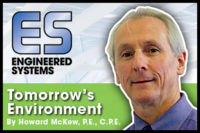Experience has shown me that many consulting engineers perform a dual role of PM and project engineer when designing a project. There can be some economy in having one of the mechanical and electrical design engineers who is working on a job take on this extra role.
Unfortunately, most do not excel at the PM task, and most do not seek out educational programs to continuously improve the PM role. Instead, many get into the position because they have good communication skills and it pays more, and not necessarily because they have good PM and documentation skills.
Documentation is the foundation of successful project management and is critical to client satisfaction. Communication is easy, but one needs to deliver on the services they provide. The PM can’t simply rely on talk. If you have read my past columns, you may recall my “24-hour rule” for sending out your meeting minutes and/or field visit reports. Rather than go searching for this discussion, you can go online at www.esmagazine.com and click on my podcast on time management, which is an important skill for all but in particular for the PM in project management success.
Being proficient at project management doesn’t stop in the consulting engineer’s office, either. All those other building services require skilled PMs such as construction companies, third-party TAB consultants, and facility management to mention three businesses. Here are five good traits of a successful PM:
- Listen, listen, listen and hear your customer
- Be proactive and not reactive
- Lead through example
- Don’t accept “can’t” because your competition “can”
- Don’t assume anything
- Not managing the meeting
- Handing out last meeting’s minutes at this new meeting vs. my 24-hr rule
- Not sending out the next meeting’s agenda ahead of time
- Not assigning a person and due date to each task
- Not following up on past correspondence, schedules, etc.
MEETING AND CONFERENCE RULES
An important PM tool is the efficient scheduling and facilitating of project meetings. It is a time management business tool to facilitate the efficient use of everyone’s time. To maximize every attendee’s commitment, it is essential that the PM have meeting rules. Here is my 2011 version of meeting/conference rules,* which you should frame and post on the meeting room door, with a second copy framed and located on the conference room table:- Send out an agenda ahead of time: Attendees need to come prepared to contribute.
- Arrive on time: Don’t penalize those who came early and/or on time by waiting.
- All cell phones must be powered off, not on “vibrate.”
- All computers must be powered off, unless everyone is using the computer for meeting content.
- No “muting” when video conferencing. Be there when you are there.
- Don’t leave the meeting. Anyone leaving disrupts the conversation.
- All attendees must contribute. Get involved or get out.
- Listen. Don’t interrupt and certainly don’t raise your voice.
- No side conversations. One topic and solution at a time.
- Be polite. Show professional courtesy.
- Accept consensus and support the team.
- Maintain accurate meeting minutes. Keep up with assignments and due dates, and distribute the meeting minutes within 24-hrs of the meeting.
- Finish on time. Don’t affect other people’s schedules.
- Follow up on the meeting minutes on a regular basis. Don’t wait until next meeting to see what was agreed to.



